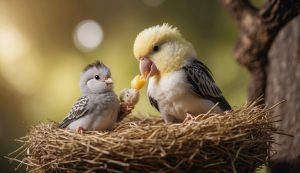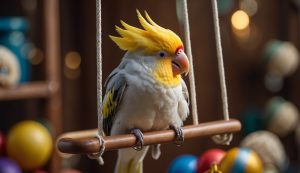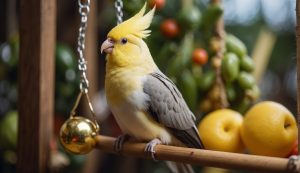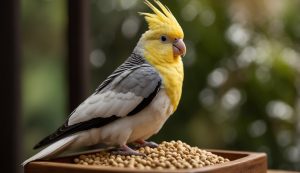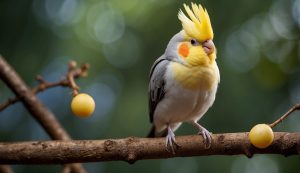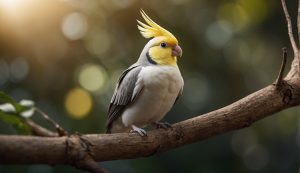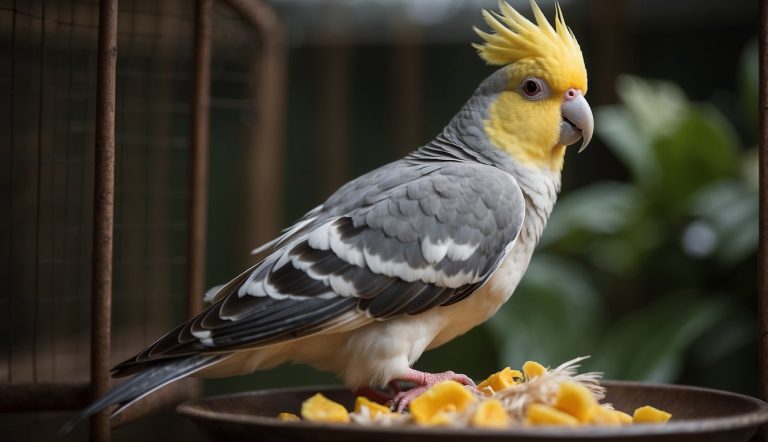Are Cockatiels Clean Birds? Uncovering the Truth About Their Hygiene Habits

Cockatiels are often praised for their engaging personalities and their striking appearance, with their distinctive crests and variety of color patterns.
As pets, these charming birds have a reputation for being both friendly and social, making them a popular choice for families and individuals alike. An important aspect of their care is hygiene.
Many potential and current cockatiel owners wonder about the cleanliness of these birds. I can assure you that cockatiels are naturally inclined to keep themselves clean.
They typically spend a part of their day preening, which is the process of arranging their feathers using their beak, ensuring that their plumage is well-maintained and free from dirt.

Maintaining a clean environment for a cockatiel is crucial, as it not only reflects on their physical health but also on their emotional well-being.
Since they are social creatures, the interaction they receive, both from other birds and their human companions, plays a significant role in their lifestyle.
Whether they are at play or rest, a clean habitat prevents the build-up of bacteria and promotes a healthy lifestyle.
This shared responsibility between the pet and the owner helps keep cockatiels neat and tidy, leading to a happier and potentially longer lifespan for these cherished birds.
Key Points
- Cockatiels have a natural habit of preening to keep their feathers clean.
- A clean and hygienic environment is essential for a cockatiel’s health.
- Regular interaction and care are vital for the well-being of these social pets.
Table of Contents
Cockatiel Care Essentials

When I talk about cockatiel care, I focus on three core areas: their living space, diet, and cleanliness. These are crucial for a happy and healthy bird, and getting it right can mean a world of difference for your feathered friend.
Creating a Comfortable Environment
Cage: I ensure the cage is spacious enough for my cockatiel to comfortably move around. A length of at least 2 meters is ideal for their wingspan. Water and Freshness: I always keep fresh water available and change it daily to prevent bacteria growth. The environment should be free of any toxic products that can harm my bird.
Diet and Nutrition
Feeding: A balanced diet is key. I include a variety of pellets, vegetables, and occasional fruit to provide essential nutrients. Health: Proper nutrition is vital to prevent malnutrition – a common issue in cockatiels.
Health and Hygiene
Cleaning: Regular cleaning of the cage and accessories is part of my routine to maintain a hygienic environment. Bath: I offer a shallow dish for my cockatiel to bathe as it promotes good feather health. When cleaning wounds or dealing with health issues, I take special care and consult my avian vet if needed.
Behavior and Interaction
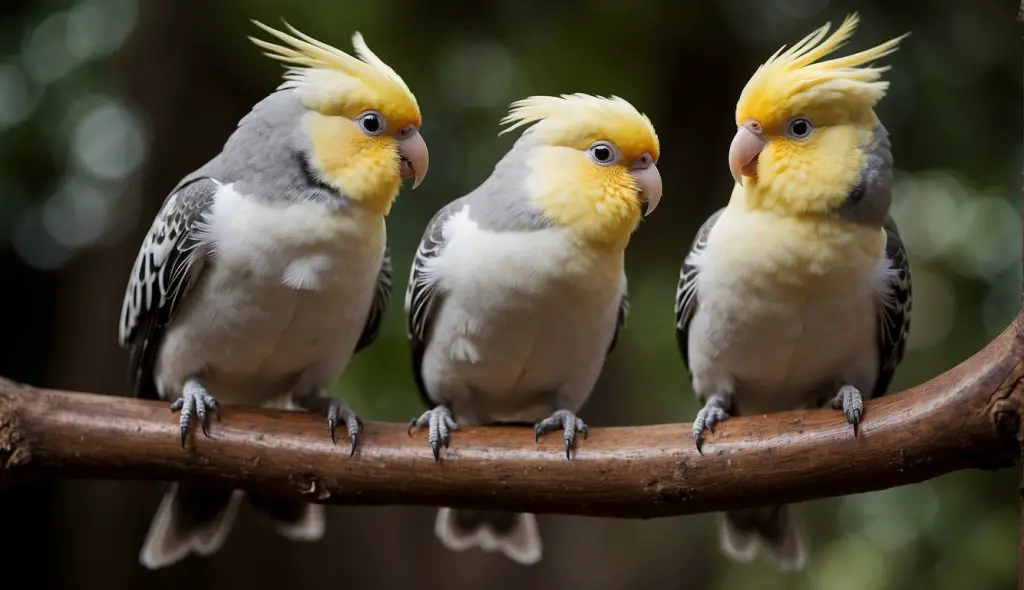
In my experience as an avian enthusiast, I’ve found that understanding the behavior of cockatiels and providing them with proper training and mental stimulation can contribute significantly to their overall cleanliness and happiness.
Understanding Cockatiel Behavior
Cockatiels are a highly social species known for their playful personality and friendly nature. They often enjoy participating in activities with their human companions or other birds in the flock. Observing their behavior, such as preening—which is how they maintain and clean their skin and feathers—is crucial for any cockatiel owner. These pet birds can also express themselves through chirping and whistling. While they may not talk like some parrots, they’re splendid whistlers. It’s essential to recognize signs of normal and abnormal behaviors, as sudden aggression or a change in activity might indicate a health issue necessitating a visit to an avian veterinarian.
- Toys: Provide a variety of toys to keep them engaged, as these can help mimic the mental stimulation they would receive in the wild.
- Preening: Watch for regular preening behavior; it’s a good indication of a content and well-adjusted bird.
- Chirp and Whistle: A chirping or whistling cockatiel tends to be a happy one, so I encourage my cockatiel to vocalize in a healthy manner.
Training and Mental Stimulation
Training is not just about teaching tricks; it’s a form of mental stimulation that is vital for the well-being of cockatiels. Through positive reinforcement, I’ve successfully trained my birds to perform simple tasks and even to play in ways that keep their environment tidy. Consistent training sessions can also strengthen the bond between us and help manage or prevent aggressive tendencies. Molting can be a stressful period for cockatiels, but engaging them in mental exercises can aid in keeping spirits high during this time.
- Consistent Routine: I keep training sessions short and regular, as consistency helps with learning and behavior stability.
- Positive Reinforcement: Always using positive reinforcement encourages my cockatiel and makes training a fun experience for both of us.
- Molting Support: Extra attention and mental engagement can help a cockatiel cope with the stress and messiness of molting.
By dedicating time to understanding and interacting with my cockatiel properly, I ensure a happy, healthy, and clean environment for my feathered companion.
Understanding the Cockatiel Lifespan

When I think about cockatiels, the charming birds often recognized by their distinctive yellow crests, I’m reminded of their relatively long lifespan. Being a member of the cockatoo family, these Nymphicus hollandicus can enjoy a lengthy life, provided they receive optimal care.
In my experience, cockatiels typically live between 15 and 20 years, but some may even reach 30 with proper nutrition, a well-maintained environment, and regular check-ups with a veterinarian. The key is to replicate their natural habitat and diet as much as possible, which significantly helps in preventing health issues.
Important Factors Affecting Lifespan:
- Diet: A balanced diet rich in vitamins and especially calcium is vital for strong bones and overall health.
- Environment: I always ensure they have a clean and spacious cage, with opportunities for safe, supervised flying to promote mental and physical wellbeing.
- Healthcare: Regular visits to the veterinarian can help catch and treat common issues such as fatty liver disease early on.
It’s my belief that a well-cared-for cockatiel not only flourishes in their golden years but also enriches mine with their affectionate companionship. Each time I see my cockatiel’s yellow crest perk up, I’m reminded how our care influences their vibrant place within the Nymphicus family, ensuring they lead a full and happy life.
Frequently Asked Questions
I’ve gathered common queries that beginner cockatiel owners often have, and provided clear, concise answers to help you better understand and care for your feathered friend.
How should I care for a cockatiel if I’m a beginner?
When starting with a cockatiel, I ensure the bird has a safe, comfortable environment, along with a proper diet consisting mainly of pelleted food. Social interaction and stimulation are also crucial for their well-being.
What are the typical expenses involved in owning a cockatiel?
The costs for my cockatiel include the initial setup for the cage and accessories, regular veterinary check-ups, a balanced diet, toys for enrichment, and potential grooming expenses.
What is the average lifespan of a cockatiel?
From my experience, a well-cared-for cockatiel can live for 15 to 20 years, sometimes even longer with exceptional care.
What items are essential for a cockatiel’s cage?
The essentials for my cockatiel’s cage include a variety of perches of different textures and widths, food and water dishes, safe toys, and a cuttlebone or mineral block for beak health.
How can I manage the noise levels of a pet cockatiel?
To manage my cockatiel’s noise levels, I provide regular interaction, create a routine, and sometimes use background music or white noise to help keep the bird calm and entertained.
What regular grooming do cockatiels require?
I regularly trim my cockatiel’s nails and give it access to a bath for self-cleaning. Wings should be trimmed by a professional if you wish to limit their flight around the house.

